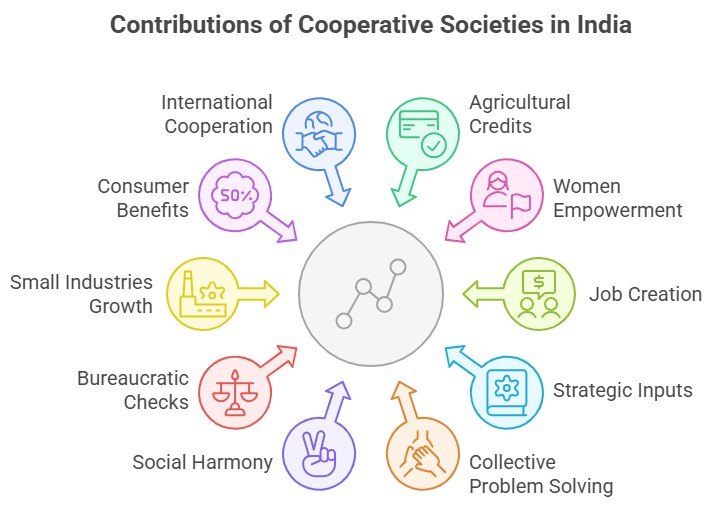Explore the cooperative movement in India: its principles, role in agriculture, women empowerment, job creation, challenges, and reforms under the Multi-State Co-operative Societies (Amendment) Bill, 2022 for a transparent and democratic system.





|
Features |
Multi-State Co-operative Societies Act, 2002 |
Multi-State Co-operative Societies (Amendment) Bill, 2022 |
|
Election of the Board members |
Elections to the board are conducted by its existing board |
Co-operative Election Authority to be established by the Central government to conduct elections and other functions |
|
Amalgamation of co-operative societies |
By passing a resolution with at least two-thirds of the members, present and voting |
State co-operative societies to merge into an existing multi-state co-operative society, subject to the respective state laws. |
|
Fund for sick co-operative societies |
No Provision |
It establishes the Co-operative Rehabilitation, Reconstruction, and Development Fund for the revival of sick multi-state co-operative societies. |
|
Restriction on redemption of government shareholding |
Shares of government authorities can be redeemed based on the bye-laws of the society. |
It stipulates that the central and state governments cannot redeem any shares without their prior consent. |
|
Redressal of complaints |
No Provision |
The central government will appoint one or more cooperative ombudsmen with territorial jurisdiction. |
Over 1500 multi-State co-operative societies in India help their members economically and socially. The amendment proposes the Cooperative Election Authority, Cooperative Information Officer, and Cooperative Ombudsman to make multi-State Cooperative societies more democratic, open, and responsible.


Refine your answer writing skills and elevate your UPSC preparation with personalized support and expert feedback.
Fill out the form to get started with the program or any other enquiries !








Are you dreaming of becoming an IAS officer? Then, IAShub can be your best guide. It is one of the Best IAS Coaching in Delhi. Many students who want to clear the UPSC exam join IAShub for learning. The institute gives both online and offline classes. Their teachers are experienced and helpful. They easily explain every topic. Students also get notes, tests, and tips to do well in the exam.
IAShub is in Delhi and is trusted by many UPSC students. It offers coaching for every part of the UPSC exam – Prelims, Mains, and Interview. The classes are simple and easy to understand. The teachers are experts and guide students in the right way. IAShub is also known for its helpful notes, test series, and answer-writing practice. IAShub is the best coaching in Delhi and also gives UPSC Online Classes. This helps students from any place in India to learn. The online classes are live and also recorded. So, students can watch them anytime. These classes cover the full UPSC syllabus.
Here are some important services provided by IAShub:
The UPSC Civil Services Exam has three parts:
This exam is tough, but with the right guidance, it becomes easy to manage. Students must study smart and stay regular.
IAShub supports students from the beginning to the end. It gives the right books, tests, and notes. The classes are easy to follow, and the teachers are always ready to help. Students get personal doubt sessions too. The test series and answer checking help students learn where they need to do better. Also, free study materials save time and money.
IAShub also guides students during the final stage – the interview. Experts take mock interviews and give useful tips. This full support makes IAShub one of the best IAS coaching in Delhi.